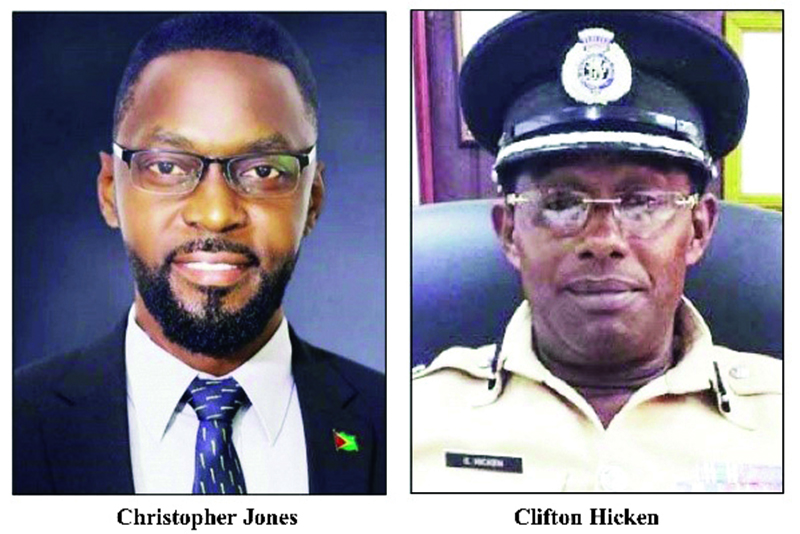Though the Constitution requires consultation between the President and Leader of the Opposition before a person is appointed to act as Commissioner of Police, government is maintaining that the appointment of Clifton Hicken to so act without the required consultation, was done out of necessity on grounds of national security, there being no Opposition Leader at the time and among other things, Hicken’s “experience” and “qualification.”
This continues to be government’s position as is expressed in the defending affidavit of Minister of Home Affairs Robeson Benn on behalf of Hicken and the Attorney General (AG) against whom the Opposition is challenging the appointment.
Notwithstanding the State’s recognition of the need for consultation, however, Benn says he believes the advice of the AG that the exclusive authority to determine who is appointed Commissioner of Police, rests with the President.
Government officials have said that President Irfaan Ali had employed the Doctrine of Necessity in naming Hicken, as the position had become vacant with the retirement of Nigel Hoppie.
Hicken was appointed on March 30th this year.
In May, APNU+AFC Chief Whip Christopher Jones moved to court to challenge the appointment.
Jones in his Fixed Date Application (FDA) contends that the invocation of the Doctrine of Necessity for the appointment is unreasonable and unlawful and that the appointment violates Article 211(1) and 211(2) of the Constitution.
At a hearing of the case last Friday, acting Chief Justice Roxane George SC reluctantly granted Attorney General Anil Nandlall SC a request to file an affidavit in defence to the appointment.
The request was met with vigorous opposition from Jones’ attorney Roysdale Forde SC, who argued that the State was beyond the legal time-limit in which such an affidavit should have been filed.
He advanced that what the AG was essentially attempting to do, was rely on documents being filed way after Hicken’s controversial March 30th appointment; even as he argued that the filing of such documents at the current stage of the proceedings would have no relevance.
Nandlall, in response, however, sought to contend that the case raises important legal issues which need final determination by the Court; and against this background said that he needed an opportunity to file a defence, in order to establish a factual foundation for canvassing the legal issues he intends to raise.
The Chief Justice agreed with Forde that an affidavit in defence was irrelevant, but reluctantly granted Nandlall’s request, warning that if the Court does find his affidavit to be irrelevant, he will have to pay costs.
Justice George made it clear that the Court will be entertaining no ex post facto material.
The affidavit in defence filed by Benn on behalf of government contends among other things, that “having regard to his experience and ranks…I am of the considered view that Mr. Hicken is qualified to act in and perform the functions of the office of Commissioner of Police.”
He further deposed that in accordance with the Police Act, it is the Commissioner of Police or someone acting in that office who is to have command of the Force and be responsible to the Minister “for peace and good order throughout Guyana.”
Benn said that in addition to those “core and fundamental functions,” there are a multiplicity of significant powers, duties and functional responsibilities which devolve upon the office of the Commissioner of Police under numerous pieces of legislation.
The Home Affairs Minister said his research has revealed that in the 183-year existence of the Guyana Police Force (GPF), there has never been a vacuum in the office of the Commissioner of Police.
Given the responsibilities bestowed on the office of the Commissioner, Benn said that from his “vantage point” he is of the view that a vacuum in the office would not only place in jeopardy peace and order; but would also significantly affect the discharge of the manifold functions, power and duties of the office.
He deposes in the defending affidavit too, that a vacuum in the office would have also left the Force and its para-military structure without an officer authorized to superintend over it, thereby jeopardizing the enforcement of law and national security itself.
According to Benn, given the implications for national security, he was informed by the President, and he believes that Ali would have himself “formed the opinion that it would be inimical, if not catastrophic, to the public’s interest, law and order and Guyana’s territorial integrity” to have left a vacuum in the office of Commissioner of Police, while he awaited the appointment of an Opposition Leader.
Benn opined that had that been done, it would have been time-consuming to have then given time for consultation, then to consult on the reconstitution of the Police Service Commission (PSC), and also appoint a Chairman of the Commission.
These, he said, were all factors taken into consideration that led to Hicken’s acting appointment; which he said is intended to be transient until the appointment of a PSC and Chairman.
These latter two appointments have since been recently made, but are also the subject of separate litigation. Following the filing of those actions, Ali has also since written Opposition Leader Aubrey Norton, seeking consultation on Hicken’s appointment, though he (Ali) had already made the appointment.
For this reason the President’s request appears baffling as the appointment was made when there was neither an Opposition Leader nor a chairman of the PSC – both of whom have to be consulted on the appointment.
Notwithstanding the State’s recognition of the need for consultation, however, Benn says he believes the advice of the AG that the “spirit and letter of the Constitution resides in the President the exclusive authority to determine whom he shall choose as a candidate to hold or to act,” as Commissioner of Police.
He said that this is subject to a duty to conduct meaningful consultations, and that in the exercise of that exclusive authority, Ali chose Hicken “as a fit, proper and duly qualified person…to act temporarily.”
In all the circumstances, the State is asking the Chief Justice to dismiss Jones’ FDA.
To the State’s resort to the Doctrine of Necessity and argument that there was no Opposition Leader with whom the President could have consulted at the material time, Jones has argued that Guyana had effectively been without a constitutionally appointed Commissioner of Police since May 1st, 2021, but that Ali appointed Hicken to act without any requisite consultation and then improperly sought recourse to the Doctrine of Necessity.
Jones’ contention is that the doctrine is not available in those circumstances. He says that in the Guyana context, history has shown that where there exists a sitting Deputy Commissioner, the acting appointment would have taken place based on seniority.
Among other things, he wants the Court to declare not only that the invocation of the Doctrine of Necessity was unlawful, but that without the required consultation, Hicken’s appointment is also a nullity.








